Table of Contents
Home / Blog / Web Development
How to Hire Web Developers: A Detailed Guide
August 4, 2025

August 4, 2025
Hiring a web application developer is not just a technical decision; it is fundamentally a business decision. This is because your website is essentially your digital office, and the web developers you choose determine the quality of experience customers will have when they interact with your brand.
Understanding the gravity of this task requires that you know how to hire web developers, because the success of your business rests on finding the right web developer.
However, this is easier said than done—there are various hiring models, skills, tech stacks, and job titles available. The perfect developer isn’t necessarily the one with the best set of skills—even though that is very attractive—but the developer who fits your unique objectives and fits seamlessly into your workflow.
Finding this alignment is not as easy in practice as it is in theory.
This article will provide practical steps on how to hire web application developers for your unique projects. Here you will find everything you need to know—from defining your project and choosing a hiring model, to knowing the essential skills to look out for and asking the right interview questions.
So, let’s learn how to hire web developers, shall we?
Understanding Your Needs: Why Project Scope Determines the Developer You Hire
The first step to hiring a web developer is understanding exactly what you want them to build. This begins with having a clear understanding of your business and its current needs. It also depends on what you need to do to give your customers a more wholesome experience.
As such, you need to conduct extensive customer and market research to gain a clear understanding of customer needs and trends, so that your solutions can align with the developer you eventually hire. If you lack the necessary knowledge to execute this step, you can partner with a web app development company that offers this service. This way, you can create products that align with current needs.
Understanding your unique objectives also helps you map out features and gauge the complexity of your project. This way, you can hire web application developers who are truly suited for your job. For instance, if you want to build a simple static website, a junior freelancer would do the job just right; however, if you need to build a dynamic SaaS platform, a full-stack senior developer should be your preferred choice.
You can use this breakdown to match project complexity with the right type of developer.
- Simple website (e.g., blog or portfolio): This project is straightforward and does not require extensive interactivity. As such, a front-end developer or even a no-code builder is well-suited for this project.
- Business website with admin panel: This project requires various features, including dashboards, forms, user logins, and CMS. As such, you need to hire a developer who understands API integration and data security. The best fit is a full-stack developer.
- Complex apps (marketplaces, dashboards, e-commerce): Because these apps typically require performance optimization, modular architecture, and scalable infrastructure, you need developers who are skilled at API integration, authentication, databases, and even DevOps.
- Long-term digital product: If you plan to build a long-term project with continuous iterations, consider a dedicated developer team or an in-house hire. Because they understand the long-term roadmap, these developers will help maintain code quality and contribute to planning or testing cycles
Actionable steps: Before you reach out to a developer, you need to define:
- Your must-have features,
- Timeline,
- Expected traffic
- Technical requirements
- Integrations
- User accounts
Related Read: 10 Benefits of Hiring a Web Development Company
Developer Types and Roles: Front-End, Back-End, and Full-Stack—What’s the Difference?
There are three different classifications of developers based on their specific roles. These are front-end developers, back-end developers, and full-stack developers. Understanding these different developer roles guides you on how to hire web developers that match your project.
Here’s a breakdown of the three most common web developer types:
- Front-End Developers: These developers design everything you can see when you land on a website. This includes the visuals, animations, layouts, and mobile responsiveness. Their tech skill typically include HTML, CSS, JavaScript, and frameworks such as React, Vue, or Angular. A strong candidate should be able to create websites that work well on every device and are consistent with our brand.
- Back-End Developers: These developers handle the underlying technology that powers the website. These include the servers, databases, and application logic. Their technical skills include Node.js, PHP, Python, Ruby, and frameworks such as Laravel or Django. If your website requires login systems, user dashboards, or payment processing, then you should consider hiring a back-end developer.
- Full-Stack Developers: These guys can handle both front-end and back-end tasks. As such, they reduce web application development cost significantly. This makes them the go-to option for startups or medium-sized projects that require cost-effective solutions without compromising on price. Great full-stack developers can build and deploy a complete web app by themselves. They can also manage hosting, troubleshoot both UI bugs and server errors while keeping your code lean.
Skills That Matter: Key Technical and Soft Skills to Look For in a Web Developer
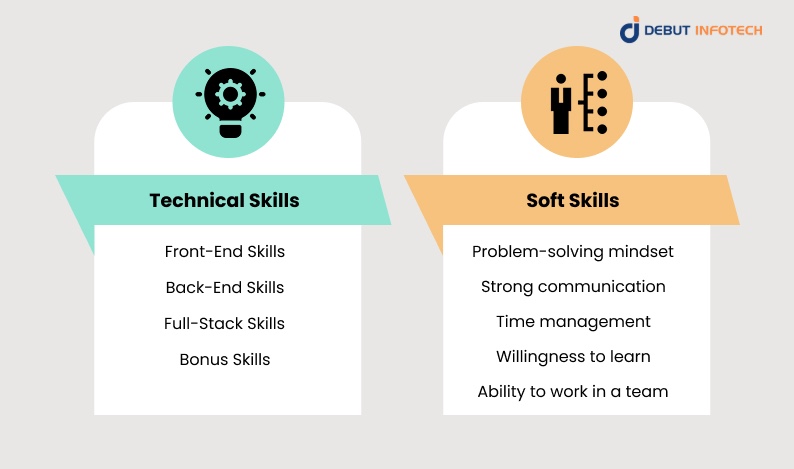
Together with experience, skills provide a clear picture of a web application developer’s capability.
Here’s a checklist of the most important technical skills depending on your needs:
- Front-End Skills: When hiring a front-end developer, ensure they possess the following skills as a minimum: HTML5, CSS3, JavaScript (ES6+), React, Vue, Angular, responsive design, and version control (Git). If they know TypeScript, testing frameworks (like Jest), and accessibility standards (WCAG) it is an added benefit that could improve the quality of your project.
- Back-End Skills: Back-end developers should know how to use Node.js, PHP, Python, Ruby, Laravel, Django, RESTful APIs, and database management (SQL, MongoDB). You could give preference to those familiar with GraphQL, caching strategies, queuing systems, or containerization (such as Docker).
- Full-Stack Skills: A full-stack developer should possess all the necessary skills of front-end and back-end developers, as well as server setup, caching, testing, and basic DevOps practices. They should also understand cloud services, such as AWS or Heroku, CI/CD pipelines, and security practices, including encryption and access control.
- Bonus Skills: While these are not part of the tech stack for web development, developers who understand SEO optimization, performance optimization, and third-party integrations can give your project a slight edge.
While tech skills are important, they are not everything—you need developers who communicate well, follow instructions, and adapt to feedback. Without these soft skills, your project will not benefit from the developer’s technical abilities.
Here are some soft skills to look out for:
- Problem-solving mindset: The right developer should be able to identify what’s wrong with the code and fix it promptly.
- Strong communication: It enables your developer to align the project with your business objectives. Look out for developers who can explain what they are doing in clear, simple language.
- Time management: You do not want to work with developers who are consistently tardy, regardless of their skill level. As such, you need to determine whether your developers can meet deadlines or accurately scope their work before hiring them.
- Willingness to learn: The developer you choose should be able to adapt when you change directions.
- Ability to work in a team: teamwork is central to the success of complex projects. Therefore, your choice of developer should be able to collaborate effectively with designers, marketers, or project managers.
Hire the right developers for your project
Contact us to hire the best web developers with the right expertise and experience for your project.
Hiring Models: Freelancers, In-House Developers, Agencies, or Dedicated Teams?
Once you have a clear understanding of what your project will solve and the skills to make this possible, the next step is to choose a hiring model.
There are four major hiring models that you can choose from. Ultimately, your choice should be determined by your budget, timeline, and project size.
1. Freelancers
Freelancers are a great option for startups to hire responsive web developers because they do not require a long-term contract—you can hire them when the need arises and pay them for the time spent. This flexibility allows you to scale up or down as needed. Thus, they save a lot of money while bringing in a wealth of experience and skill.
The downside to working with freelancers is that they aren’t always available when you need them, and you need to monitor them closely if you want consistently good outputs.
However, working with freelancers also carries risk. Availability may fluctuate, and you may need to manage them closely to maintain consistency and communication.
2. In-House Developers
These guys are permanent staff of your company. If you are developing a core project or need to maintain a team for iterative tasks, then they are a sensible option. One major advantage of in-house developers is that they have a deep understanding of your business and can collaborate on a daily basis. However, in-house developers are more expensive to maintain, as you need to pay salaries, benefits, and even rent office space.
3. Agencies
Agencies give you all the services you need to launch your web product, including design, development, and project management. They are a great solution if you want a ready-made product without getting your hands dirty. They offer convenience, high professionalism, and structured processes, but at a cost—they are usually more expensive, and you don’t get to decide who works on your project.
4. Dedicated Development Teams
Hiring a dedicated software development team offers the benefits of in-house developers and agencies while mitigating their associated disadvantages. For instance, with dedicated development teams, you get the long-term commitment of an in-house team with reduced overhead costs. Unlike agencies, dedicated development teams give you more control over who works on your project while maintaining professionalism and convenience.
The table below compares the different hiring models, their strength,s and their weaknesses:
| Model | Strengths | Weaknesses | Best For |
| Freelancers | Flexible, budget-friendly, and easy to scale up or down. You can bring in skilled professionals only when you need them—ideal for quick, short-term work. | Availability can be unpredictable, and quality control may require hands-on monitoring to ensure consistency and good communication. | Startups or small teams looking for on-demand help without a long-term commitment. |
| In-House Developers | They understand your business deeply, collaborate daily, and are a stable part of your team. Ideal for long-term, high-priority or evolving projects. | Comes with high overhead—salaries, benefits, office space—and it takes time to hire and onboard the right talent. | Companies working on core products that need tight integration and daily collaboration. |
| Agencies | Provide an all-in-one solution—design, development, project management—delivered with professionalism and structured execution. | Often expensive, with less flexibility. You don’t get to choose the specific developers, and you have less say in how the work is executed. | Businesses seeking a hands-off, turnkey solution to launch a product quickly. |
| Dedicated Dev Teams | Combines the commitment of in-house staff with the cost savings of outsourcing. You maintain control while benefiting from skilled, long-term partners. | Typically, it requires a long-term relationship and clear communication to integrate with your workflow fully. | Projects needing ongoing development with consistent output, but without full in-house costs. |
Where to Find Web Developers: Top Platforms and Hiring Sources That Work
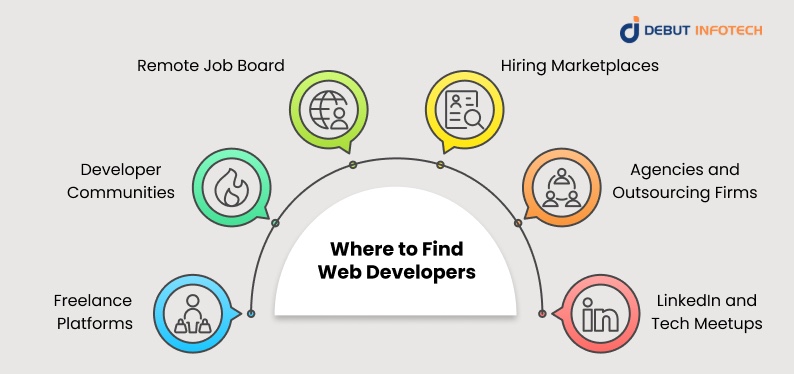
Now that you have a clear understanding of your objectives and preferred hiring model, the next step is to identify where you can find and hire web app developers that match your criteria..
Here are the most effective places to find web developers:
- Freelance Platforms: Freelance platforms such as Upwork, Toptal, Fiverr, Lemon.io, and Gun.io are excellent places to find highly skilled developers. These platforms offer features that enable you to compare rates, conduct interviews directly, manage projects, and ensure you get value for your money.
- Developer Communities: Developer communities, such as GitHub, Stack Overflow Jobs, and Dev.io, are the preferred destinations for companies seeking to hire progressive web app developers. On these platforms, you can see contributions to open-source projects, code samples, and ask technical questions directly.
- Remote Job Boards: Similar to freelance platforms, these platforms provide access to skilled developers seeking full-time or contract roles. Examples include WeWork Remotely, Remote OK, and AngelList Talent.
- Hiring Marketplaces: Hiring marketplaces like Deazy, Talentport, and Lemon.io help you vet developers and match them to your project. This reduces recruitment time significantly.
- Agencies and Outsourcing Firms: You can partner with development firms like Debut Infotech Pvt Ltd to get access to dedicated development teams that will handle your development project from start to finish. When working with an agency, it is always important to look out for testimonials, portfolios, and transparent pricing.
- LinkedIn and Tech Meetups: If you’re looking to hire a developer long-term, then LinkedIn is a great place to start. You can also attend local tech meetups to find your next hire.
Before hiring, always review their past work, client feedback, and conduct a short technical test or live coding task.
Related Read: Top 10 Websites to Hire Web Developers
Interview and Evaluation: Questions to Ask and How to Assess Developer Quality
Interviewing a developer is a crucial step in finding the right candidate who matches your project’s scope and objectives. As such, you must ask the right questions, as this can significantly determine the quality of the developer you end up with.
Here are smart questions to ask:
- “Tell me about a past project. What was your role?”
- “How do you handle feature changes during a project?”
- “Can you explain how you manage version control?”
- “How do you ensure your code is secure?”
- “What’s your approach to testing and debugging?”
From their answers, you can look out for the following:
- Communication clarity: How effectively can they convey technical details in business terms?
- Problem-solving ability: explore whether they are able to show structured thinking when they are under pressure.
- Willingness to collaborate: evaluate if they are open to new ideas or if they incorporate feedback into their workflow
- Portfolio strength: gauge their portfolio strength by looking for real-world examples, live links, and GitHub repos.
- Tool familiarity: find out if they are comfortable with Git, project boards, documentation, etc.
- Verify their comfort with Git, project boards, documentation, and other relevant tools.
Build customized web platforms
Hire pre-vetted web developers for your next project from Debut Infotech’s talent pool.
Conclusion
To hire web app developers, you need to understand your project scope, research developers’ skills, pick a hiring mode, and interview selected candidates. This is a complex, multistepped, time-intensive process that could distract you from what really matters—running a high-value business. You could skip this process and still hire great developers at a cost-effective rate when you partner with Debut Infotech Pvt Ltd. We will handle the entire development process, providing you with the convenience you need to focus on running a profitable business. Reach out to us today.
Frequently Asked Questions
Developing a web app can cost anywhere from $15,000 to $30,000. The cost depends on the complexity, features, and the developers you choose to work with. Debut Infotech offers great prices without trade-offs in performance.
When hiring a web developer, look out for both soft skills and technical skills. The ideal candidate should be a clear communicator and consistently deliver high-quality projects on time.
Before hiring a web developer, ask them about their past experiences, their communication skills, their relevant skills, and how they plan to execute your project if hired. You also want to know how they troubleshoot and fix bugs; this is important for post-deployment maintenance.
The developers most in demand in 2025 are full-stack developers. These developers can handle front-end and back-end tasks and can even bring other skillsets such as API integration, Cloud services, and even DevOps. Full-stack developers with AI/ML skills are even more valuable.
Countries with the best developers include the USA, India, Ukraine, Poland, Canada, Romania, Germany, the Philippines, and Russia.
Our Latest Insights
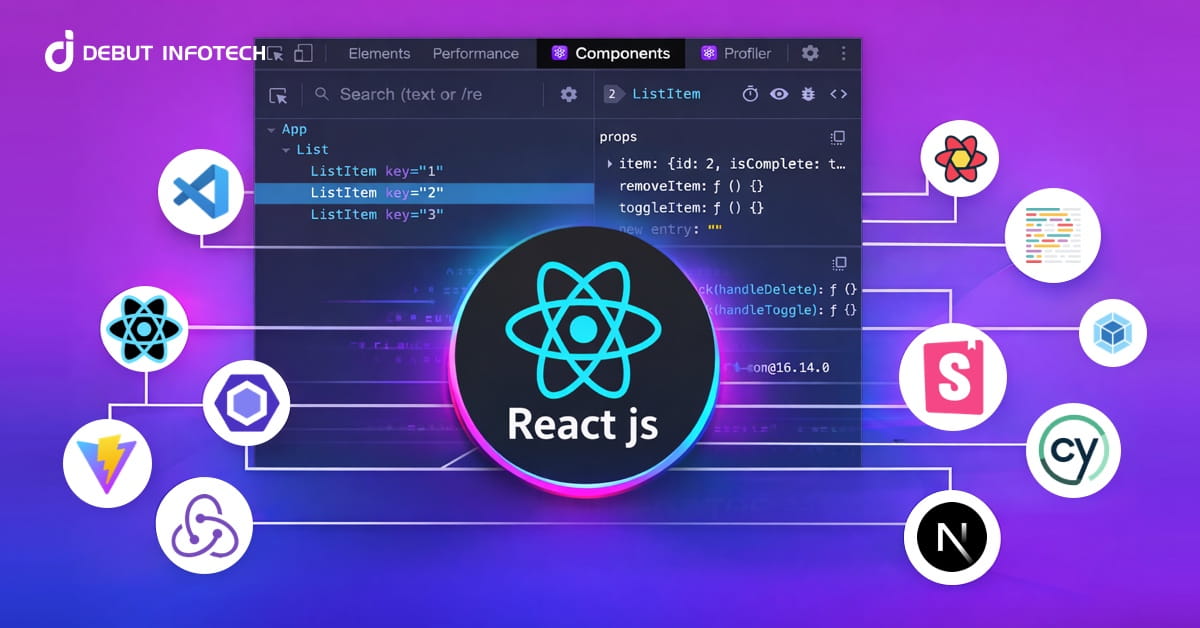
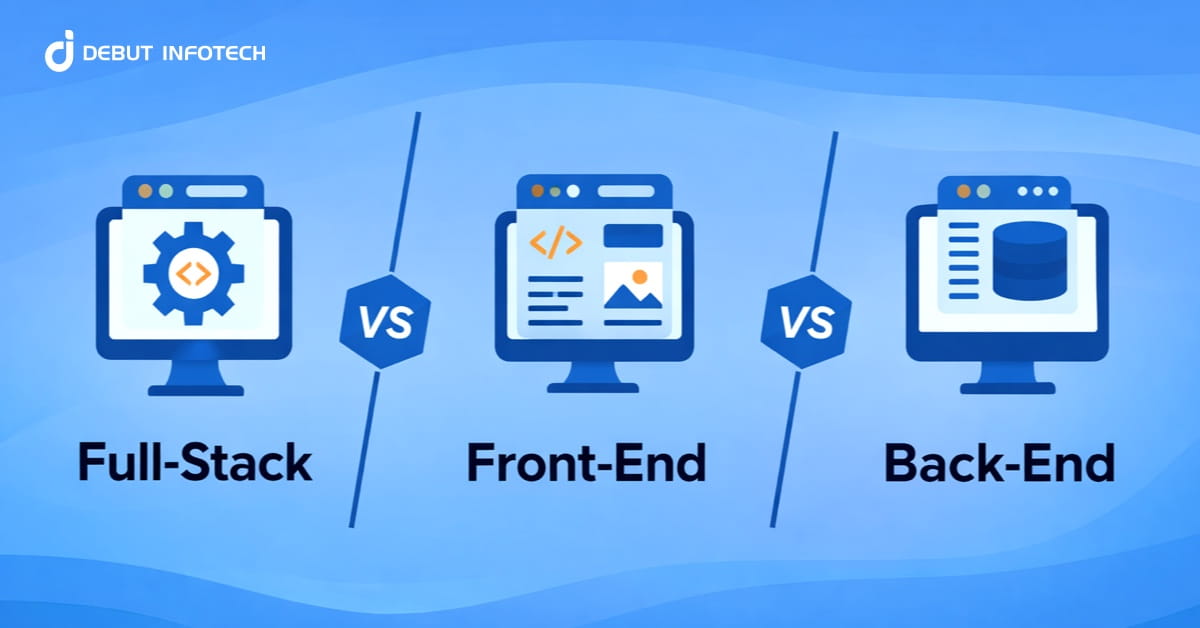
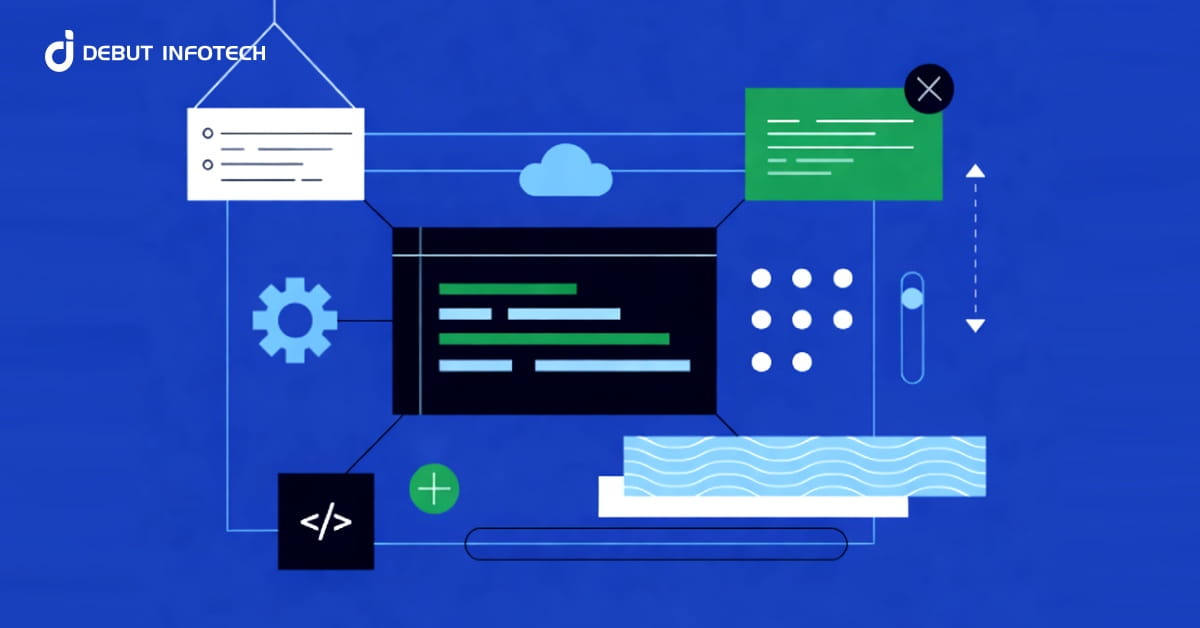
Leave a Comment